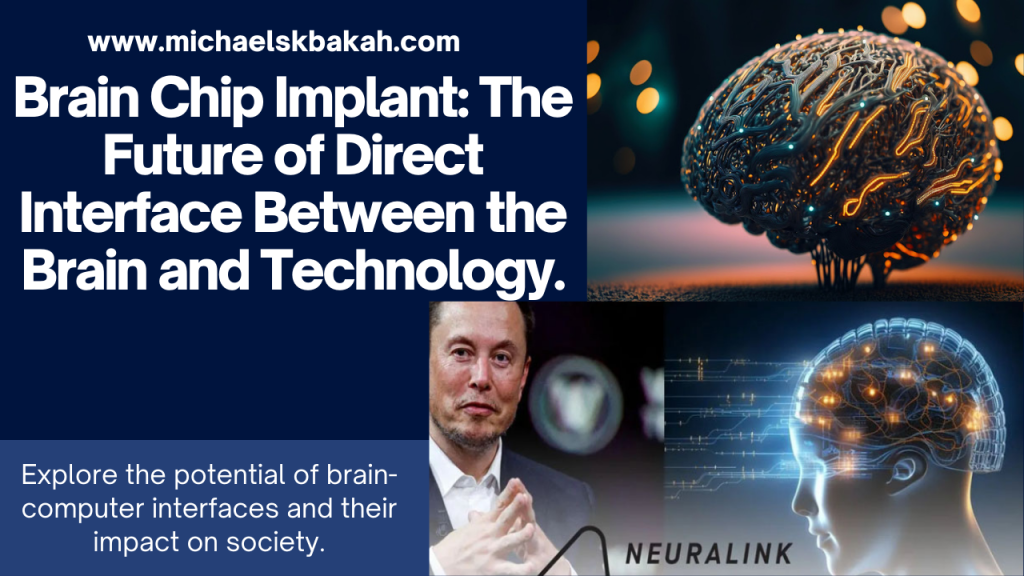Introduction to Neuralink and Elon Musk’s vision
In the realm of technological advancements, few names hold as much weight as Elon Musk. Known for his ambitious ventures such as Tesla and SpaceX, Musk has once again captured the world’s attention with his latest venture, Neuralink. This groundbreaking company aims to merge the human brain with artificial intelligence through the use of brain implants. With the recent news of Neuralink successfully implanting a brain chip in a human, the possibilities for revolutionary technologies have become more tangible than ever before.
What is a brain implant and how does it work?
A brain implant, also known as a brain chip, is a small electronic device that is surgically inserted into the brain. It is designed to enhance brain function and enable communication between the brain and external devices. These implants consist of tiny electrodes that can stimulate or record neural activity, allowing for a direct interface between the brain and technology.
The implantation process involves precision and expertise, as the device needs to be placed in specific regions of the brain to target desired functions. Once implanted, the brain chip can receive and transmit electrical signals, effectively creating a bridge between the human brain and artificial intelligence.
The breakthrough: Neuralink successfully implants a brain chip in a human
In a remarkable scientific feat, Neuralink has recently achieved a significant breakthrough by successfully implanting a brain chip in a human volunteer. This milestone marks a pivotal moment in the field of neurotechnology and opens up a myriad of possibilities for advancing human-machine interfaces.
The implantation procedure was performed with utmost care and precision by Neuralink’s team of neurosurgeons. The brain chip, equipped with numerous electrodes, was delicately placed within the volunteer’s brain. Through this implant, the individual’s neural activity can be monitored and manipulated, paving the way for groundbreaking advancements in neuroscience and technology.
Potential applications of brain implants
The successful implantation of a brain chip signifies a monumental leap forward in the field of brain-computer interfaces. The potential applications of this technology are vast and can have far-reaching implications in various domains.
One of the most promising applications of brain implants is in the field of medicine. With the ability to directly interface with the brain, these implants could revolutionize the treatment of neurological disorders such as Parkinson’s disease, epilepsy, and spinal cord injuries. By stimulating or inhibiting specific regions of the brain, brain implants could alleviate symptoms and improve the quality of life for countless individuals.
Additionally, brain implants hold the potential to enhance cognitive abilities. They could augment memory, learning, and cognitive processing, opening up new avenues for education and skill acquisition. Imagine being able to upload knowledge directly into your brain or effortlessly learn new languages – the possibilities are truly awe-inspiring.
Ethical considerations and concerns surrounding brain implants
As with any emerging technology, brain implants raise important ethical considerations and concerns. The ability to manipulate and monitor neural activity raises questions about privacy, consent, and potential misuse.
Privacy becomes a significant concern when brain activity can be accessed and monitored. Will individuals have control over their own thoughts and information? How can we ensure that unauthorized access to brain data is prevented? These are crucial questions that need to be addressed to protect the rights and autonomy of individuals.
Another ethical concern is the potential for misuse or abuse of this technology. Brain implants could be exploited for nefarious purposes or used to manipulate individuals against their will. It is imperative that strict regulations and safeguards are put in place to ensure the responsible and ethical use of brain implants.
The impact of Neuralink’s breakthrough on the medical field
Neuralink’s breakthrough in brain implant technology has the potential to revolutionize the medical field. By directly interfacing with the brain, these implants can offer new possibilities for diagnosis, treatment, and rehabilitation.
In the realm of diagnosis, brain implants could provide unprecedented insights into neurological disorders. By monitoring neural activity in real-time, doctors and researchers can gain a deeper understanding of brain function and identify patterns associated with different conditions. This knowledge could lead to more accurate diagnoses and personalized treatment plans.
When it comes to treatment, brain implants hold immense promise. In conditions such as Parkinson’s disease, where medication may not provide sufficient relief, brain implants can offer targeted stimulation to alleviate symptoms. This could significantly improve the quality of life for patients and reduce the reliance on medication.
Furthermore, brain implants can play a vital role in rehabilitation. For individuals with spinal cord injuries, these implants could restore mobility by bypassing damaged neural pathways and providing alternative routes for communication between the brain and the body. This could potentially enable paralyzed individuals to regain control over their movements and regain independence.
Revolutionary technologies that could be developed with brain implants
The successful implantation of a brain chip opens up a world of possibilities for revolutionary technologies that were once confined to the realm of science fiction. With direct access to the human brain, new frontiers can be explored in fields such as virtual reality, augmented reality, and telepathic communication.
In the realm of virtual reality, brain implants could provide a seamless and immersive experience. By directly stimulating the visual and auditory centers of the brain, users could perceive virtual environments as if they were real. This could revolutionize entertainment, gaming, and even education by creating realistic and interactive simulations.
Augmented reality, on the other hand, could be enhanced by brain implants. Instead of relying on external devices such as glasses or headsets, users could have virtual information projected directly into their visual cortex. This would eliminate the need for cumbersome equipment and create a more natural and integrated augmented reality experience.
Perhaps the most mind-bending possibility is telepathic communication. With brain implants, individuals could potentially communicate directly through their thoughts, bypassing the need for spoken or written language. This could revolutionize the way we communicate and connect with others, transcending physical barriers and enabling instant and seamless communication.
The future of brain implants and Neuralink’s role in it
The successful implantation of a brain chip in a human marks just the beginning of an exciting journey. Neuralink, under the visionary leadership of Elon Musk, aims to further advance brain implant technology and unlock its full potential.
Neuralink’s ultimate goal is to develop a high-bandwidth brain-machine interface that enables bidirectional communication between humans and computers. This would allow individuals to seamlessly merge with artificial intelligence, augment their cognitive abilities, and unlock previously unimaginable levels of intelligence and creativity.
In the future, we can expect to see continued advancements in brain implant technology. Smaller, more efficient implants will be developed, making the implantation process safer and more accessible. Neuralink will play a pivotal role in driving these advancements and pushing the boundaries of what is possible.
Criticisms and controversies surrounding Neuralink’s brain chip
Despite the immense potential of brain implants, Neuralink and its brain chip have not been without their fair share of criticisms and controversies. Some critics argue that the technology is still in its infancy and that the risks and long-term effects are not yet fully understood.
Concerns have been raised about the invasiveness of the implantation process and the potential for complications. Neurosurgery is a complex and delicate procedure, and any mistakes or malfunctions could have severe consequences for the individual. The safety and efficacy of brain implants need to be thoroughly researched and validated before widespread adoption can occur.
Another criticism revolves around the ethical implications of merging humans with artificial intelligence. Critics argue that this could blur the line between humans and machines, potentially eroding our sense of identity and autonomy. It is crucial that these concerns are addressed and that the ethical implications of brain implants are carefully considered.
Conclusion: The implications of Neuralink’s achievement and its potential for shaping the future
Neuralink’s successful implantation of a brain chip in a human is a groundbreaking achievement that holds immense potential for shaping the future. From medical advancements to revolutionary technologies, the possibilities are vast and awe-inspiring.
As we venture further into the realm of merging humans with artificial intelligence, it is crucial that we proceed with caution and address the ethical concerns that arise. Striking a balance between technological advancements and preserving our humanity will be key in harnessing the full potential of brain implants.
Neuralink, under the leadership of Elon Musk, is at the forefront of this revolution. With their relentless pursuit of innovation and their commitment to pushing the boundaries of what is possible, Neuralink is poised to shape the future of brain implant technology.
As we witness this groundbreaking achievement, it is clear that we are on the cusp of a new era in human-machine interfaces. The fusion of biology and technology has the potential to unlock unimaginable possibilities and revolutionize the way we live, work, and interact with the world. The future is here, and with Neuralink’s brain chip, the possibilities are limitless.
CTA: To stay updated on the latest breakthroughs in brain implant technology and the future of human-machine interfaces, subscribe to our newsletter and join the conversation today.






Please Leave a Comment